40.1.3 (40 > 34)
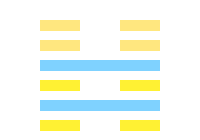
40.1.3 (40 > 34) - THE KIEH HEXAGRAM.
- 1. The first line, divided, shows that its subject will commit no error.
- 3. The third line, divided, shows a porter with his burden, (yet) riding in a carriage. He will (only) tempt robbers to attack him. However firm and correct he may (try to) be, there will be cause for regret.
40.1.3 (40 > 34) - Admitting that one should have been there
One knows the reasons of one's forfeiture.
Bing DeepL Google Yandex40.1.3 (40 > 34) - Admitting that one should have been there
One knows the reasons of one's forfeiture.
Bing DeepL Google Yandex40.1.3 (40 > 34) - Kieh, la libération
Kieh : 1. Délivrer, faire échapper, échapper au danger ; 2. Disperser ; 3. Ouvrir, séparer, s’ouvrir. Se dit du mouvement de la germination. 4. Résoudre une difficulté, une complication.
-
1. Délivrer quelqu’un est chose excellente.
Quand le fort et le faible s’entendent selon la justice, il n’y a pas de faute à craindre. -
3. Si un porteur se met dans un char et qu’il survienne des voleurs, il sera attaqué et échappera difficilement ; s’il abandonne sa charge, il pourra se sauver.
Pour un porteur, aller en char est honteux ; c’est attirer sur soi les voleurs.
Il n’appartient pas à des gens du commun d’aller en char .
40.1.3 (40 > 34) - Admettre qu'on aurait dû être présent
On connaît les raisons de sa déchéance.
Bing DeepL Google Yandex40.1.3 (40 > 34) - Módosítás
- 1. Fel akarja szabadítani magát, ez egy jó döntés.
- 3. Ha valaki elhanyagolja, másoknak adja.
The trigrams
The trigrams are combinations of three yin and yang lines. The three bottom lines of the hexagram form the lower trigram and represent the inner situation. The three top lines form the upper trigram and represent the outer situation.
Upper trigram: The thunder

Lower trigram: The water The sky


The formation: 40
What is already there
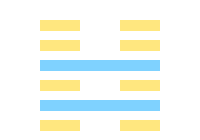
40 - THE KIEH HEXAGRAM.
In (the state indicated by) Kieh advantage will be found in the south-west. If no (further) operations be called for, there will be good fortune in coming back(to the old conditions). If some operations be called for, there will be good fortune in the early conducting of them.
Bing DeepL Google Yandex40 - Kieh, la libération
Kieh : 1. Délivrer, faire échapper, échapper au danger ; 2. Disperser ; 3. Ouvrir, séparer, s’ouvrir. Se dit du mouvement de la germination. 4. Résoudre une difficulté, une complication.
Texte et commentaire
Si l’on réussit à faire échapper aux dangers, on gagnera les gens à soi et l’on aura des relations heureuses ; on gardera le milieu. En tout ce que l’on fait, l’activité est chose utile et fait acquérir des mérites. Kieh est : se trouvant en danger, savoir agir et échapper. Quand le ciel et la terre ouvrent les pores (3e sens) des êtres, le tonnerre et la pluie se produisent. Alors les plantes et les arbres à fruit bourgeonnent. Bien important est le temps où tout s’ouvre.
Symbolisme
Le tonnerre et la pluie forment le Koua Kieh. Le sage est indulgent pour l’erreur et traite les coupables avec douceur.
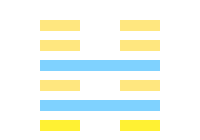
40.1 (40 > 54) - THE KIEH HEXAGRAM.
The first line, divided, shows that its subject will commit no error.
Bing DeepL Google Yandex40.1 (40 > 54) - Wanting to lose one's constraints
One wants to free oneself, it is a good decision.
Bing DeepL Google Yandex40.1 (40 > 54) - Wanting to lose one's constraints
One wants to free oneself, it is a good decision.
Bing DeepL Google Yandex40.1 (40 > 54) - Kieh, la libération
Kieh : 1. Délivrer, faire échapper, échapper au danger ; 2. Disperser ; 3. Ouvrir, séparer, s’ouvrir. Se dit du mouvement de la germination. 4. Résoudre une difficulté, une complication.
Délivrer quelqu’un est chose excellente.
Quand le fort et le faible s’entendent selon la justice, il n’y a pas de faute à craindre.
40.1 (40 > 54) - Vouloir perdre ses contraintes
On veut se libérer, c'est une bonne décision.
Bing DeepL Google Yandex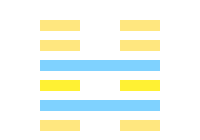
40.3 (40 > 32) - THE KIEH HEXAGRAM.
The third line, divided, shows a porter with his burden, (yet) riding in a carriage. He will (only) tempt robbers to attack him. However firm and correct he may (try to) be, there will be cause for regret.
Bing DeepL Google Yandex40.3 (40 > 32) - Forgiving slight mistakes
When one neglects, one gives to others.
Bing DeepL Google Yandex40.3 (40 > 32) - Forgiving slight mistakes
When one neglects, one gives to others.
Bing DeepL Google Yandex40.3 (40 > 32) - Kieh, la libération
Kieh : 1. Délivrer, faire échapper, échapper au danger ; 2. Disperser ; 3. Ouvrir, séparer, s’ouvrir. Se dit du mouvement de la germination. 4. Résoudre une difficulté, une complication.
Si un porteur se met dans un char et qu’il survienne des voleurs, il sera attaqué et échappera difficilement ; s’il abandonne sa charge, il pourra se sauver.
Pour un porteur, aller en char est honteux ; c’est attirer sur soi les voleurs.
Il n’appartient pas à des gens du commun d’aller en char .
40.3 (40 > 32) - Pardonner les fautes légères
Quand on néglige on donne aux autres.
Bing DeepL Google YandexIn the making: 34
What is poised to happen
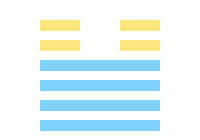
34 - THE TÂ KWANG HEXAGRAM.
Tâ Kwang indicates that (under the conditions which it symbolises) it will be advantageous to be firm and correct.
Bing DeepL Google Yandex34 - Tá tchuáng, la grande force
Tá tchuáng : grande force
Texte
Elle donne succès et achèvement.
Symbolisme
Le tonnerre au-dessus du ciel représente la plus grande force. Ainsi le sage ne fait pas un pas, un acte contrairement aux règles
Commentaire
Tá tchuáng est le grand devenu fort, le mouvement dirigé par la force ; c’est aussi le fort, juste et droit. La rectitude et la grandeur manifestent les sentiments du ciel et de la terre.
The nuclear hexagram: 63.2.4 (63 > 43)
The nuclear hexagram is the association of the two inner trigrams (lines 2,3,4 and 3,4,5). It represents the root, or the origin of the situation.
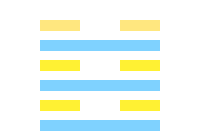
63.2.4 (63 > 43) - THE KÎ 3Î HEXAGRAM.
- 2. The second line, divided, (shows its subject as) a wife who has lost her (carriage-)screen. There is no occasion to go in pursuit of it. In seven days she will find it.
- 4. The fourth line, divided, shows its subject with rags provided against any leak (in his boat), and on his guard all day long.
63.2.4 (63 > 43) - Tchi tzi, ce qui suit l’achèvement
Tchi-tzi : traversée achevée, achèvement, succès, moyen d’achever, compléter.
-
2. Voyage fini (interrompu), comme d’une femme qui, ayant perdu le voile de son char (Keū tchi pi, tenture qui entourait le char et cachait la personne qui le montait. Sans ce voile, une femme vertueuse ne pouvait voyager. Son voyage était donc fini jusqu’à ce qu’elle le retrouve et elle ne pouvait aller à découvert pour le chercher) ne peut le chercher, mais le retrouve seulement après quelques (sept) jours.
Elle agit ainsi parce qu’elle suit la voie de la sagesse. -
4. Lorsque les bords, les franges d’un habit se mouillent, il faut être sur ses gardes jusqu’au bout de la traversée (ou bien : lorsqu’en bateau on est obligé d’employer les bords de ses habits pour boucher les trous, etc.).
Il y a lieu de craindre alors.
63.2.4 (63 > 43) - Le maximum
On trafique pour gagner plus d'argent que nécessaire.
Bing DeepL Google Yandex63.2.4 (63 > 43) - Maximum
- 2. Nem kér bizalmat de megkapja a javítások révén.
- 4. Ha valaki nem várt nehézségbe ütközik, siessen ellenőrizni.
Ruler
The starting situation

40.3 (40 > 32) - THE KIEH HEXAGRAM.
The third line, divided, shows a porter with his burden, (yet) riding in a carriage. He will (only) tempt robbers to attack him. However firm and correct he may (try to) be, there will be cause for regret.
Bing DeepL Google Yandex40.3 (40 > 32) - Forgiving slight mistakes
When one neglects, one gives to others.
Bing DeepL Google Yandex40.3 (40 > 32) - Forgiving slight mistakes
When one neglects, one gives to others.
Bing DeepL Google Yandex40.3 (40 > 32) - Kieh, la libération
Kieh : 1. Délivrer, faire échapper, échapper au danger ; 2. Disperser ; 3. Ouvrir, séparer, s’ouvrir. Se dit du mouvement de la germination. 4. Résoudre une difficulté, une complication.
Si un porteur se met dans un char et qu’il survienne des voleurs, il sera attaqué et échappera difficilement ; s’il abandonne sa charge, il pourra se sauver.
Pour un porteur, aller en char est honteux ; c’est attirer sur soi les voleurs.
Il n’appartient pas à des gens du commun d’aller en char .
40.3 (40 > 32) - Pardonner les fautes légères
Quand on néglige on donne aux autres.
Bing DeepL Google YandexCorrection
The direction where the ruler is going to bend

40.1 (40 > 54) - THE KIEH HEXAGRAM.
The first line, divided, shows that its subject will commit no error.
Bing DeepL Google Yandex40.1 (40 > 54) - Wanting to lose one's constraints
One wants to free oneself, it is a good decision.
Bing DeepL Google Yandex40.1 (40 > 54) - Wanting to lose one's constraints
One wants to free oneself, it is a good decision.
Bing DeepL Google Yandex40.1 (40 > 54) - Kieh, la libération
Kieh : 1. Délivrer, faire échapper, échapper au danger ; 2. Disperser ; 3. Ouvrir, séparer, s’ouvrir. Se dit du mouvement de la germination. 4. Résoudre une difficulté, une complication.
Délivrer quelqu’un est chose excellente.
Quand le fort et le faible s’entendent selon la justice, il n’y a pas de faute à craindre.
40.1 (40 > 54) - Vouloir perdre ses contraintes
On veut se libérer, c'est une bonne décision.
Bing DeepL Google Yandex
